#well this was a text wall
Text
Okay, as someone who has so far only heard the first two episodes (and season trailer) of The Magnus Protocol, I'm going to try to write down my own little thoughts for the communal red string board.
I don't actually think Jonah is linked to the computer voices, I think the third voice will be Annabelle Cane's, and the reason the voices weren't part of the computer system until about a year ago is because they're linked to the Archives Reality Tape Web™ attaching itself to the Protocol Reality, remember the voice of the Archivist was the important part and the tapes were just a way for the Spider to steer that voice where it wanted the Fears to go, they followed the Archivist's voice and the Archivist's voice being in Protocol means the Archives Reality Fears did find the Protocol world, and have just become part of the Fear there.
So far so normal, the voices are from Archives, so are probably avatars the Archives Fears brought with them.
This is where it gets a little weirder, I don't think they're actually linked to the computer any more than the rest of the Statements are, my theory is that the computer is picking them up as Something Spooky and compiling it with the rest, and the owners of these voices are still in a remote location unrelated to the Protocol PCs.
But they're clearly reading Protocol Reality Statements so here's where I'm torn between two ideas.
They as people are reading out these Statements to feed the Fears and the computer is adding their spooky voices to the file.
Or, the voices themselves were what was considered Spooky and the computer added them, but as it was just a voice and not really any associated story or text the PC didn't actually know where to file them and because of this the voices just became incorporated into the system, floating in uncategorizable limbo.
But our blorbos might not be trapped in a modified version of Windows NT 4.0, the businessfocused predecessor to 95.
Please feel free to add your own thoughts to this, I would love to hear them, I'm literally putting this on the internet so me and the three people who see this can laugh about it in a year's time.
#well this was a text wall#far more of a text wall than I planned it to be#but I wrote it and now you can read it#and in that we are connected across distance and time#my Cassette Tape Web™ has begun#yes I know Reddit is usually the place for theory posts like this but I'm already comfy here#tmagp spoilers#tma spoilers#the magnus protocol#the magnus protocol spoilers#tmagp
21 notes
·
View notes
Text

Felt a bit nostalgic watching RT shut down…Here are the og faves again for old times sake 💙
#rvb#agent washington#agent Carolina#lavernius tucker#michael j caboose#epsilon#my art rvb#ahhh a lot of feelings…of course I stepped away from rt as a company a long time ago#but RvB is special to me!! it was my first fandom experience ever#and the community here on tumblr specifically was so instrumental to me growing up#I really could not have asked for a better community of artists and writers to grow up in. I know it sounds like platitudes when I say#that everyone was super nice and talented but REALLY. People were so kind to me and somehow I became well known despite#my art and writing and me in general still being immature and hashtag cringe#I found my creative legs and#people would respond to my stuff with walls and walls of support in the tags and we would do exchanges and events every year#I made my first lyric comic and it’s still doing extremely well on YouTube even today!! my dad who passed away recently always loved it#and my favorite RvB writer came out of hibernation to write me a bunch of text wall asks about it#I’ve never had another fandom experience quite like RvB#I still keep in touch with many of my friends from that time period even though we’ve all moved on the other things#these guys will always always have a place in my heart#so long reds and blues….
875 notes
·
View notes
Text
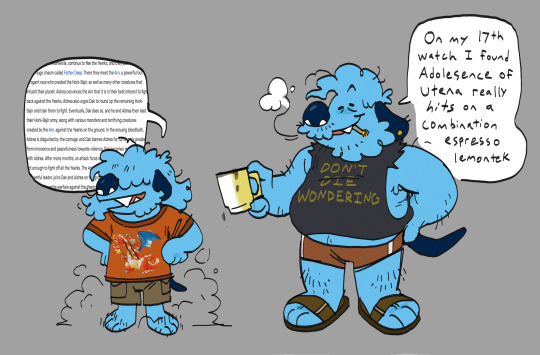
12 -> 27
character development but it's kind of a lateral move
#fatdog#this was for a meme but i cannt find the original post for the life of me... oh well#if you recognize the text wall we r friends
537 notes
·
View notes
Text
if the theory of sam reich being replaced by .. evil wizard dalton reich (and i cant believe i am partaking in this discurse) is true..
i've seen some people asking the question about what those childhood tapes mean. Well i am one of the ancient ones that owned vhs tapes and you know you could replace whats stored on those tapes with overwriting it with new material but it would slowly degrade the quality as the magnetic tape the information is stored on isn't necessarly made to be re-recorded on indefinetly which would also explain the degrading quality of the gamechanger episode.
So my theory is that dalton reich wants to erase sam from history and to do this he is slowly erasing any proof that could hint on sam and dalton being two different people. One thing he appearantly needed to do is overwrite these old vhs tapes of sams childhood.
#game changer#dropout tv#Sam Reich#having worked in an archive i think depending on quality of the tape and what generation it is#you can record and re-record on it 5-10 times#which would fit the loops on the episode kinda#listen i wanted to be cool but i love time loops OKAY#I am actually in disbelieve that no one tackled sam to the ground#like brennan did during the dance thing in the “second place” episode#and screamed “DANCING IS A SIN”#to keep Sam from kicking the god damn camera#i also feel like i've been hexed with the wenis curse#you see all those text about it and think.. well... how bad can it be? truely?#and the answer is simple#EVERYBODY DO THE WENIS#THE WENIS IS A DANCE#EVERBYODY IS A GENIUS#WHO KNOWS IS IN ADV (gunshoots.. sirens blaring in the background.. and a wet thud sounds right next to you)#also.. not to be like alu head levels of conspiracy but by now the nimber of accounts#saying the dropout cast should be hunting down sam as the final game changer episode of the season#is suspicious to me#like... if that turn out to be a fixitman situation of people being IN on something#am just going full balls to the wall riz gukgak tatooing night yorb on his chest levels of insane by now 👍#also the sfx needed thing#reminds me about how jacob always does his own buzzer sound#because clearly the normal buzzer sound was always there#also.. the red shining buzzer reflecting in the prompt screen..that wasn't always that way right?
162 notes
·
View notes
Text
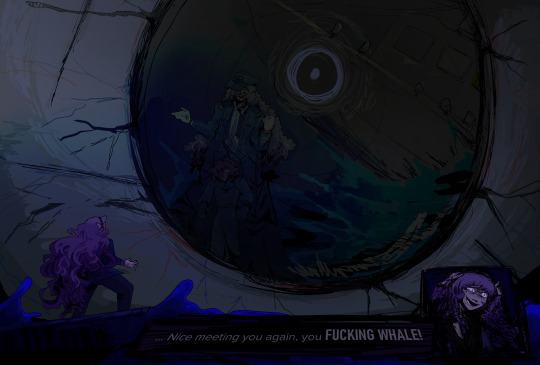
textless under cut
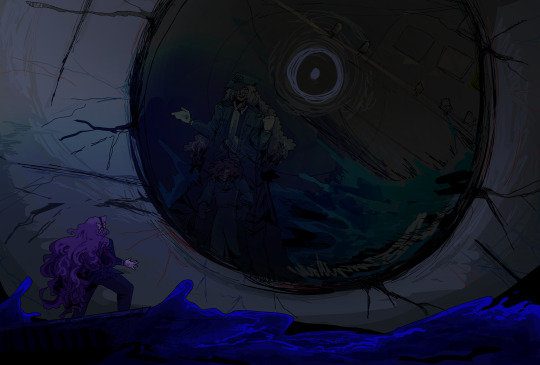
#myart#limbus company#ishmael#ahab#i wanted to do a cool text box thingy but its sort of janky#oh well#this scene cool as hell!!#i always think of a wall of text to put as tags while drawing#but then i forget all of the things i want to say when i get around to posting it
278 notes
·
View notes
Text
Some would rebut that “Oppenheimer,” being a Hollywood blockbuster with serious global reach (whether it will play Japanese theaters remains uncertain), will be many audiences’ only exposure to the events in question and thus might “create a limit on public consciousness and concern,” as the poet, writer and professor Brandon Shimoda told The Times. A corollary of this argument: The crimes committed against the people of Hiroshima and Nagasaki were so unspeakable, so outsized in their impact, that Oppenheimer’s perspective does and should dwindle into insignificance by comparison. For Nolan to focus so exclusively on an American physicist’s story, some insist, ultimately diminishes history and humanity, even as it reinforces the Hollywood hegemony of the great-man biopic and of white men’s narratives in general.
I get those complaints. I also think they betray an inherent disrespect for the audience’s intelligence and curiosity, as well as a fundamental misunderstanding of how movies operate. It’s telling that few of these criticisms of perspective were leveled at “American Prometheus” when it was published in 2005, that no one begrudged Bird and Sherwin for offering a meticulously researched, morally ambivalent portrait of their subject’s life and consigning the destruction of two Japanese cities to a few pages. That’s because books are books, the argument goes, and movies are movies — and this perceived difference, it must be said, reveals a pernicious double standard.
Because they seldom achieve the narrative penetration and richness of detail of, say, a 700-page biography, movies, especially those about history, often are hailed as achievements of breadth over depth, emotion over intellect. They are assumed to be fundamentally shallow experiences, distillations of real life rather than sharply angled explorations of it, propelled by broad brushstrokes and easy expository shortcuts, and beholden to the audience’s presumably voracious appetite for thrilling, traumatizing spectacle. And because movies offer a visual immediacy and narrative immersion that books don’t, they are expected to be sweeping if not omniscient in their narrative scope, to reach for a comprehensive, even definitive vantage.
Movies that attempt something different, that recognize that less can indeed be more, are thus easily taken to task. “It’s so subjective!” and “It omits a crucial P.O.V.!” are assumed to be substantive criticisms rather than essentially value-neutral statements. We are sometimes told, in matters of art and storytelling, that depiction is not endorsement; we are not reminded nearly as often that omission is not erasure. But because viewers of course cannot be trusted to know any history or muster any empathy on their own — and if anything unites those who criticize “Oppenheimer” on representational grounds, it’s their reflexive assumption of the audience’s stupidity — anything that isn’t explicitly shown onscreen is denigrated as a dodge or an oversight, rather than a carefully considered decision.
A film like “Oppenheimer” offers a welcome challenge to these assumptions. Like nearly all Nolan’s movies, from “Memento” to “Dunkirk,” it’s a crafty exercise in radical subjectivity and narrative misdirection, in which the most significant subjects — lost memories, lost time, lost loves — often are invisible and all the more powerful for it. We can certainly imagine a version of “Oppenheimer” that tossed in a few startling but desultory minutes of Japanese destruction footage. Such a version might have flirted with kitsch, but it might well have satisfied the representational completists in the audience. It also would have reduced Hiroshima and Nagasaki to a piddling afterthought; Nolan treats them instead as a profound absence, an indictment by silence.
That’s true even in one of the movie’s most powerful and contested sequences. Not long after news of Hiroshima’s destruction arrives, Oppenheimer gives a would-be-triumphant speech to a euphoric Los Alamos crowd, only for his words to turn to dust in his mouth. For a moment, Nolan abandons realism altogether — but not, crucially, Oppenheimer’s perspective — to embrace a hallucinatory horror-movie expressionism. A piercing scream erupts in the crowd; a woman’s face crumples and flutters, like a paper mask about to disintegrate. The crowd is there and then suddenly, with much sonic rumbling, image blurring and an obliterating flash of white light, it is not.
For “Oppenheimer’s” detractors, this sequence constitutes its most grievous act of erasure: Even in the movie’s one evocation of nuclear disaster, the true victims have been obscured and whitewashed. The absence of Japanese faces and bodies in these visions is indeed striking. It’s also consistent with Nolan’s strict representational parameters, and it produces a tension, even a contradiction, that the movie wants us to recognize and wrestle with. Is Oppenheimer trying (and failing) to imagine the hundreds of thousands of Japanese civilians murdered by the weapon he devised? Or is he envisioning some hypothetical doomsday scenario still to come?
I think the answer is a blur of both, and also something more: In this moment, one of the movie’s most abstract, Nolan advances a longer view of his protagonist’s history and his future. Oppenheimer’s blindness to Japanese victims and survivors foreshadows his own stubborn inability to confront the consequences of his actions in years to come. He will speak out against nuclear weaponry, but he will never apologize for the atomic bombings of Japan — not even when he visits Tokyo and Osaka in 1960 and is questioned by a reporter about his perspective now. “I do not think coming to Japan changed my sense of anguish about my part in this whole piece of history,” he will respond. “Nor has it fully made me regret my responsibility for the technical success of the enterprise.”
Talk about compartmentalization. That episode, by the way, doesn’t find its way into “Oppenheimer,” which knows better than to offer itself up as the last word on anything. To the end, Nolan trusts us to seek out and think about history for ourselves. If we elect not to, that’s on us.
#WOE WALL OF TEXT BE UPON YE#I thought this piece was really good 😭#and I thought the Oppenheimer movie was pretty good 😭 embarrassing! oh well#reading#oppenheimer#I just think this writing in particular is making a lot of points generally about film viewing that I’m like yeah! YEAH!#all the ideas around respecting the audience’s reading capabilities like YEAH
495 notes
·
View notes
Text
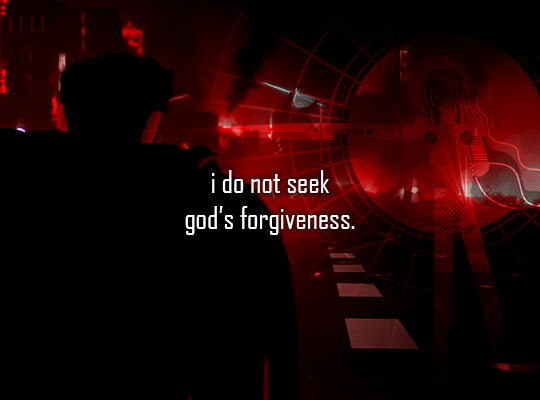
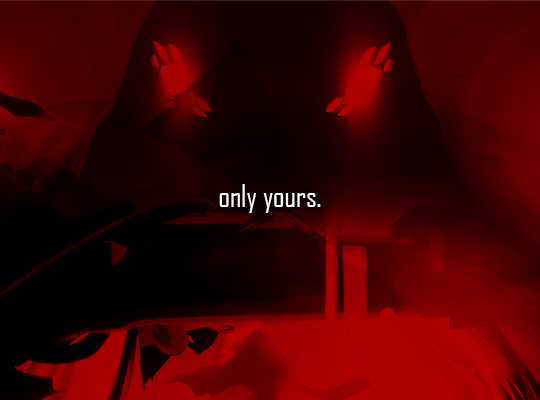
dragonheart by charles edward pogue, based on his screenplay
#nimona#nimona spoilers#nimonaedit#ballister boldheart#r you guys picking up what i'm putting down. here. because i could also write a wholeeee wall of text abt the similarities between#this film & dragonheart. an essay even.#because it's like. ough. that line when the director kills fake ambrosius. ''may gloreth forgive you''#its about ballister being the only one other than her to use gloreth's name as a stand-in for ''god''#its about ballister trying to prove he's Devout. he's following the will of gloreth.#but then realizing. well. even if she's holy. he doesn't care about her forgiveness.#he only cares to save her monster/her devil. god. do you GET it.
685 notes
·
View notes
Text
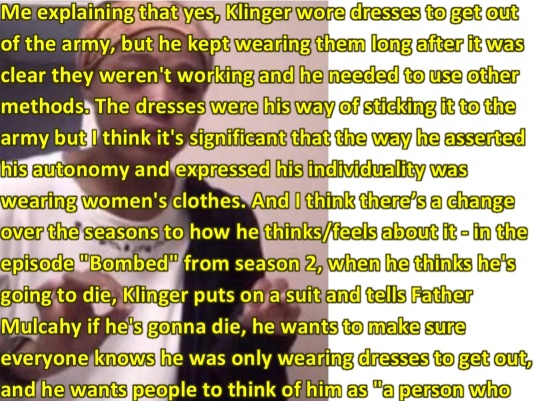

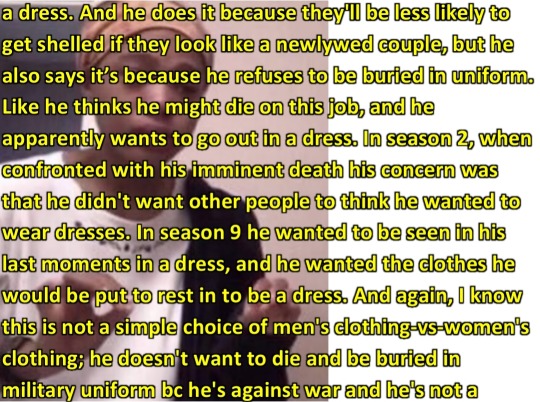
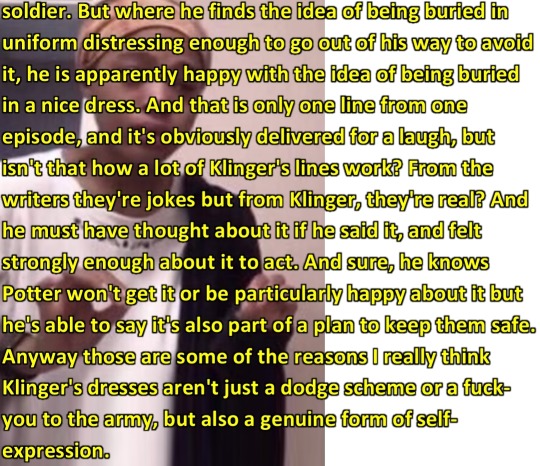
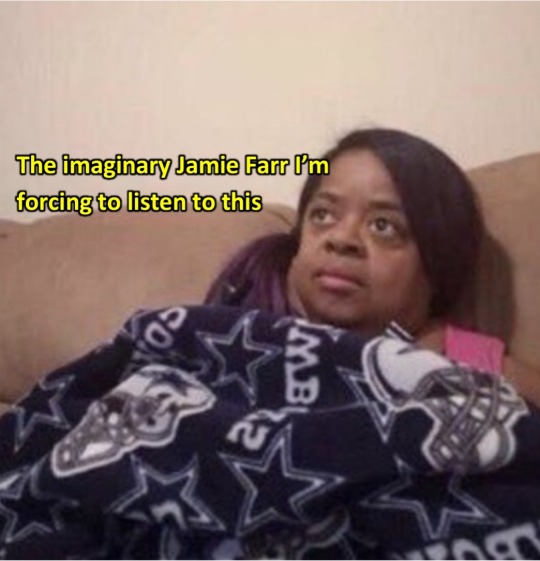
edit: the early seasons scene i mentioned is actually from "The Army-Navy Game" from season 1
#ok rereading this as i post it. i realise that klinger Does wear fatigues both before and after change of command. the issue is having to#Exclusively be in uniform. and the having no choice thing/not being Allowed to even accessorize. and i didnt really say that here but well.#im not redoing all that#me.txt#mashposting#and why did i post it in this form? well it would have been a solid wall of text
2K notes
·
View notes
Text

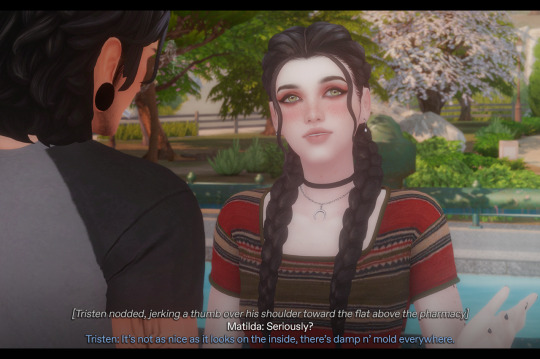
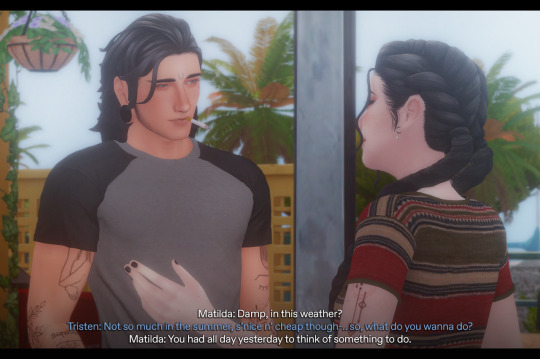
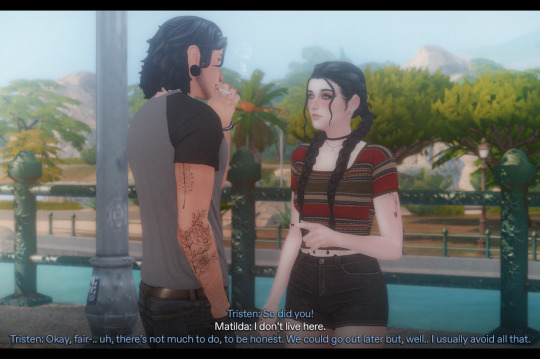
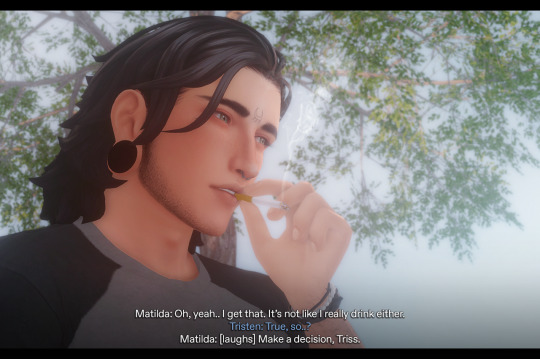
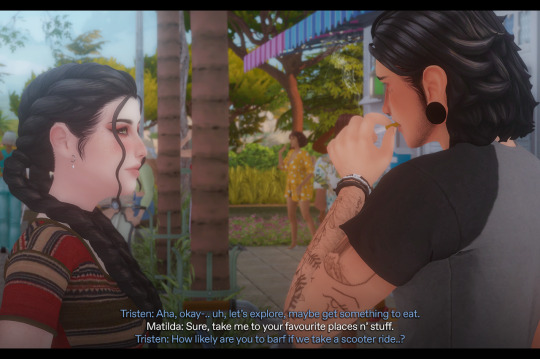

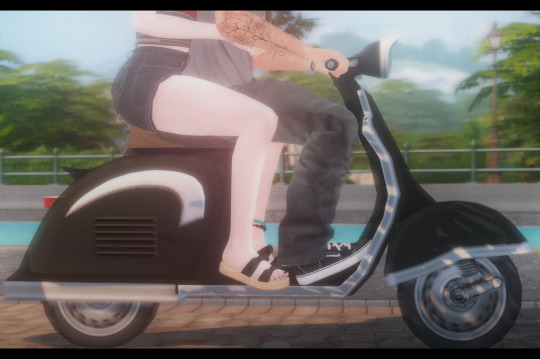
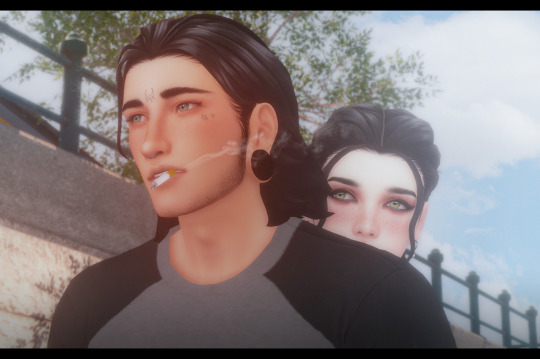
Previous // Next
Matilda: Hey.
Tristen: Hi…
Matilda: You’re early-.. live nearby?
[Tristen nodded, jerking a thumb over his shoulder toward the flat above the pharmacy]
Matilda: Seriously?
Tristen: It’s not as nice as it looks on the inside, there’s damp n’ mold everywhere.
Matilda: Damp, in this weather?
Tristen: Not so much in the summer, s’nice n’ cheap though-.. so, what do you wanna do?
Matilda: You had all day yesterday to think of something to do.
Tristen: So did you!
Matilda: I don’t live here.
Tristen: Okay, fair-.. uh, there’s not much to do, to be honest. We could go out later but, well.. I usually avoid all that.
Matilda: Oh, yeah.. I get that. It’s not like I really drink either.
Tristen: True, so..?
Matilda: [laughs] Make a decision, Triss.
Tristen: Aha, okay-.. uh, let’s explore, maybe get something to eat.
Matilda: Sure, take me to your favourite places n’ stuff.
Tristen: How likely are you to barf if we take a scooter ride..?
…
Matilda: How far are we going?
Tristen: Not too far-.. squeeze me if you wanna switch though, yeah?
Matilda: Deal.
#ts4#sims 4#simblr#ts4 story#sims story#forever in between#fib#matilda douglas#tristen burks#🛵💨#tilda talking to herself like don't barf don't sniff him don't move ur hands too far down or up n we're GOOD#sdkjskjd#nah but i kinda feel like they're the type of fRiENdS that drop right back into being comfortable w each other u kno#after the initial awkwardness/catching up stuff neway#of which imma chuck into one massive wall of text cos.. well ig i wanna get it outta the way as much as they do#lmaoo
142 notes
·
View notes
Text
Okay, but you guys do realize that the reason Mephisto behaves the way he does is because he has been raised with the intent of only being beneficial to the future demon king and nothing else, right?
(Buckle up because this is going to be a loooonnngggg post)
Mephisto comes from a family that has been serving the royal family for ages. He mentions multiple times that his family has always acted as their knights, their advisors and their protectors to them, and it won't be any different with him. It shouldn't be any different with him. Being beneficial to Diavolo has literally been decided to be the very meaning of his life even before he was born. He's been forced into the role and he's following it to a T because he's never known anything else, and because he can't afford to lose that. Without it, what else is left of him? What worth does he hold other than being essentially a tool for Diavolo?
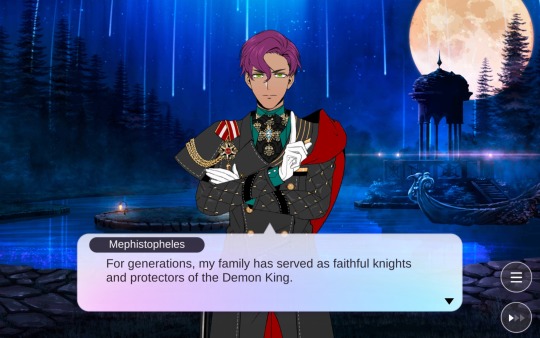
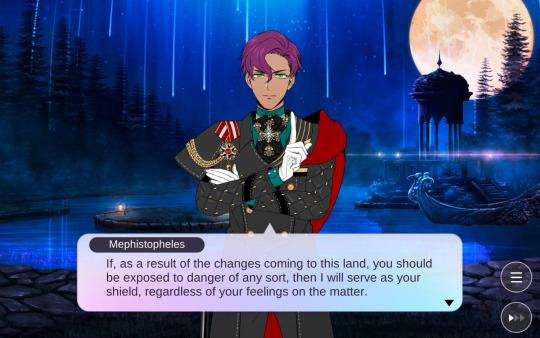
And then the brothers fall and suddenly his position is at risk. Lucifer and Diavolo have already gotten along fairly well back when Lucifer was still an angel. Both Diavolo and Lucifer (as well as several others) mention that they go way back in their Nightbringer homescreen dialogues, and we see them having mutual respect by the end of the 'The Glory Days' Devilgram in the original game. Mephisto and Diavolo meanwhile might be childhood friends, but here's the thing
Diavolo wants a friend. A real friend. Someone that genuinely appreciates him for who he is as a person instead of focusing on his status as the future demon king. And that's something Lucifer can give him. They often hang out for the sake of it (apparently even eating dinner at Ristorante Six together regularly), they regularly engage in lighthearted banter, and Lucifer isn't afraid to give Diavolo his honest opinion
But that's not really the case with Mephisto...? He was never meant to be on equal footing with Diavolo; Diavolo even calls him "mini-Barbatos" at one point. He is literally still calling him 'Lord Diavolo' all the time, requests to speak his honest opinion first and waits for Diavolo to allow him to do so before actually giving it. That's why Mephisto keeps pushing down his own feelings and keeps showering Diavolo in praise any opportunity he gets while he adjusts every aspect of life to be beneficial to Diavolo in a way. Sure, he might be popular, but as long as Diavolo doesn't want him to get married he doesn't even waste a thought about relationships. He might have no real interest in journalism, but of course he'll take over RAD's Newspaper Club. After all, Diavolo asked him to! He's part of the House of Lords because as the future king's right-hand man that just makes sense. He was always just meant to be a tool for the crown prince to use, so he doesn't know how to treat Diavolo as anything but. He was literally groomed to be dispensable, so he's obviously going to act like it
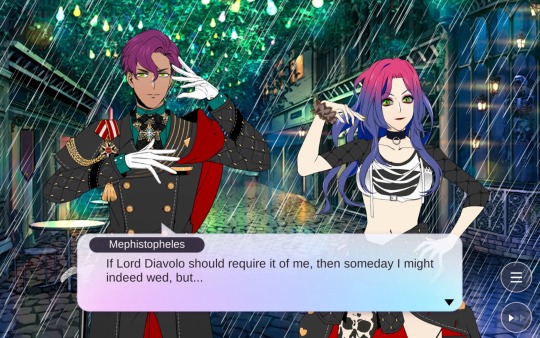
And that's also where Mephisto's dislike for Lucifer stems from—he can only watch as Lucifer slowly grows closer and closer to Diavolo, and threatens to take the role that was always made up to be his. And so Mephisto keeps challenging Lucifer over and over again, trying to sabotage their friendship any way he can in hopes of winning back his position as the crown prince's right-hand man
That obviously doesn't make the way he treats Lucifer (and the rest of the brothers!) right. Lucifer isn't responsible for any of this, and blaming him for it is misguided. But it still doesn't change the fact that Mephisto has the right to be hurt at the situation at hand. His entire purpose of existence is just being ripped away from him right before his eyes and all he can do is watch. That must hurt. Especially when your entire familiy's purpose has been to serve the royal family, and you are the first one to lose that
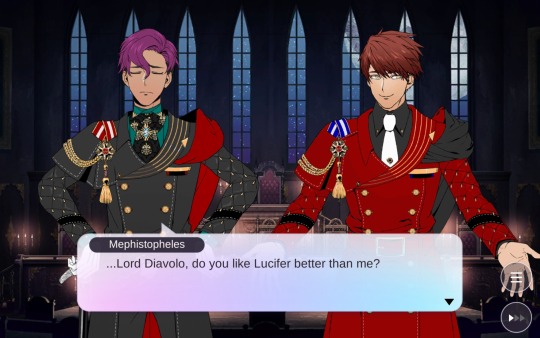
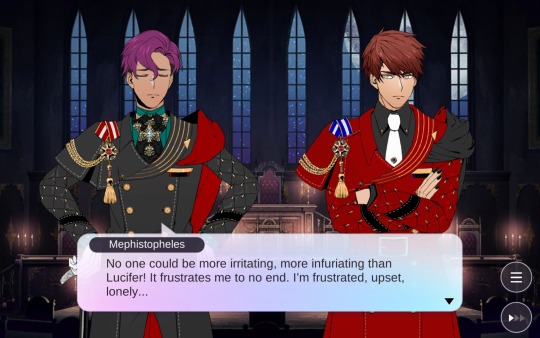
Also, I feel like something else we need to talk about is how his fight only ever really seems to be with the brothers, especially Lucifer? Again, part of the reason is the entire Diavolo situation, sure, but I feel like it also has to do with the situation in the Devildom at large? I already vaguely talked about this in a different context a few months back, but ever since the brothers have been cast out of the Celestial Realm and arrived in the Devildom, the entire situation has just been super unstable. We as a player have a unique perspective on the events because we only have a limited outsider view to on the actual politics going on the the Devildom, while also being aware how things will play out in the future. We know that ultimately letting the brothers stay is the right choice, but that's not the way a regular denizen who has to live through all this sees it. I mean, just the way Mephisto describes the brothers really puts things into perspective:
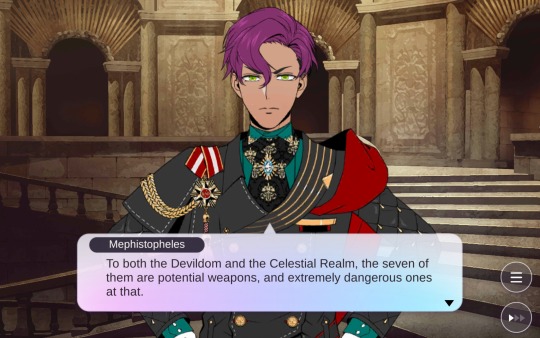
The entire realm is super destabilized, they just semi-lost their current king, and there have been multiple very real threats of war—first when the Devildom took the brothers in in the first place, then when "Raphael" showed up and told the brothers to return, and Lucifer rightfully points out to (a comatose) MC that they are bound to go to war should the Celestial Realm ever find out that Diavolo turned Lilith into a human. There's just a lot of tension in the air, and the brothers—extremly powerful as both angels and demons—seem to be at the root of most of it in one way or another. From a the House of Lords' perspective, it makes sense to want the brothers gone, same goes for a denizens perspective. And while it is a delicate situation all around that can't just be blamed on the brothers, it makes sense for Mephisto to also see them at the center of it all. Again, that doesn't make the brothers' treatment right, but it's at least understandable given the circumstances
On a side note, when discussing his beliefs, I think it's also important to remember that he to this day is incredibly sheltered. He just accepts all this as normal because to him it is normal, but as we've seen in lesson 31 hard mode Thirteen was so shocked by his views that she immediately decided to drop everything and play therapist for him (absolute Queen for not just blaming it on him btw 💖). I know this was just a throw-away line, but this paired with him basically excisting to serve Diavolo already says so much about his character:
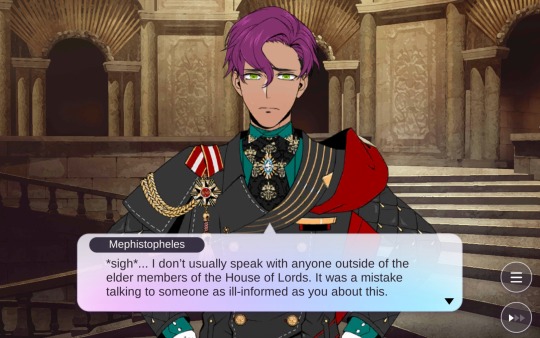
And with everyone else he seems to be generally pleasent? I mean, he says he doesn't want anything to do with angels or humans, and yet he risks getting injured in order to save Luke from falling. Yet he actively seeks out MC to solve one of the 666 Mysteries of RAD together with them, and saves them from tumbling on the floor because "anyone else would have done the same" (they wouldn't have. The season 1 brothers would have laughed straight in MC's face). He literally complained to Thirteen about how he was just about to go home and how he doesn't have time for her, yet diligently carries all her things for her as rain is pouring down on him. His actions always end up betraying his words
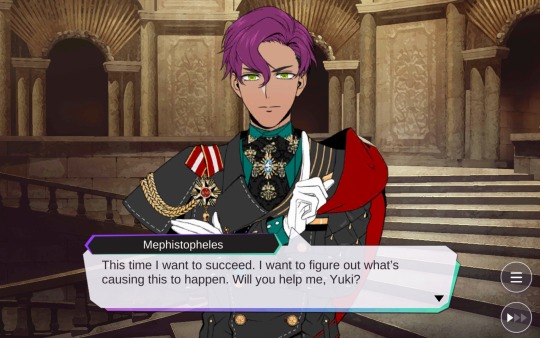
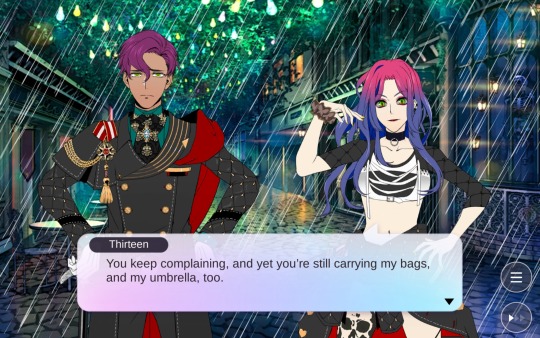
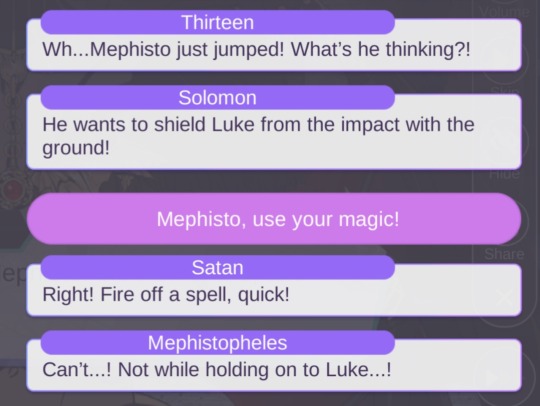
Also he has a massive sweet tooth which alings perfectly with one of the headcanons I had for months and is RAD's local horse girl so we stan! <3
-> more character & relationship analyses
-> masterlist
#i'm in desperate need of several character analyses for the entire cast and if i can't find any i'll write them myself#anyway if you stumble across any character analyses could you tag me? thank you <3#him saying he has no interest in persuing journalism is from the 'lead on mephisto!' devilgram btw#which i don't have so i unfortunately couldn't share a screenshot of it#anyway THE PROMISED MEPHISTO POST#I'M FINALLY SCREAMING ABOUT HIM WUUUUHHH#post is looonnnngg so i decided to add some screenshots to make it look less like a pure wall of text#which is also why it ended up taking longer than promised to post it i'm sorry^^;#i actually wrote a lot more but i had to cut a lot of things because it just didn't flow well#NEXT UP: another solomon mega post#obey me#obey me swd#obey me nightbringer#obey me mephistopheles#obey me analysis#obey me character analysis#;mel's analyses
187 notes
·
View notes
Note
Do you really think reverse flash is in love with Barry? I don't mean for this to sound snarky I'm just confused. Thawne killed Barry's mom how can you say he's in love with him? I like all the things you post and rb about them I really enjoy the ship. I just don't get it can you explain?
The question "how can Eobard be in love with Barry if he hurt him" has both a short answer and a long answer. The short answer is that people are very much capable of hurting the ones they love, on purpose or by accident.
The long answer is that Eobard is a deeply disturbed individual who has never been the recipient of love, and because of that and of many extremely traumatic events (including but not limited to being brainwashed in prison, being trapped in a timeless limbo alone for years, being tortured and treated like cattle and put in sensory deprivation for ludicrous amounts of time, dying at the hands of the only person who had ever shown compassion towards him), he has a skewed perception of a lot of things and is extremely bad at emotional regulation.
Moreover, and this is something which is easy to overlook but it's actually very important, Eobard is not human. His actions are informed by his traumas, but the way he approaches pretty much everything (including his "problems" with Barry) isn't done the way a human would.
Eobard is a timeless, deathless creature which embodies one of the driving forces of reality itself (the Negative Speed Force). He lived probably more than a few hundred years considering how he keeps running around through time doing stuff, and how he keeps going back to watch past events and adjust the way he will interact with the timeline next.
He knows the huge impact that killing Nora will have on Barry, but from a moral and ethical standpoint it's not a big deal for him. Nora is less than a speck in time, an NPC who served her role for that briefest moment in which she existed. She is a big deal because she is a big deal for Barry, not because she's meaningful in any other way.
"But then he did want to hurt Barry when he killed her" Yes, absolutely he wanted to. Eobard didn't "just" kill Nora Allen - he went back in time and changed everything about Barry's life, made it so he had no friends, made him grow isolated and insecure and shy, lacking confident in his abilities. And he did it because he is very, VERY angry with Barry for one, and also because isolating Barry makes it easier for them to grow closer.
And it worked! Back in the Silver Age, when Nora and Henry were alive and not in prison, Barry couldn't be bothered with Eobard. For him Eo was just a random criminal with superspeed, and sure he was threatening because speedsters always are, but not that much of a big deal.
Now? Now Eobard is a primary element in Barry's life, a constant he's had to deal with basically since birth, someone who rewritten his entire life to make himself part of it in an indelible manner.
It worked because now Barry is more likely to fall for Eobard's manipulation, to listen to him, to just accept that he's THERE because he's always been. Near the end of Running Scared, Eobard tells him "run away with me", and Barry says yes.
Back in the Silver Age there would have been no way.
It's worth mentioning that to understand Eobard, you need to understand that everything he does, every single thing, has the end goal of being with Barry. Whether he's trying to protect him or trying to hurt him or trying to manipulate him, whether they manage to work together against a common enemy or they're on opposite sides of the fight, every single one of Eobard's actions is motivated by love (his personal, inhuman version of love).
"But if that is the case, then why doesn't he just tell Barry 'I love you'?"
Two reasons, and one is meta.
The in-story reason is that every time Eobard tried to do something good without masking it as horrible, it went sideways and backfired spectacularly - mix that with poor emotional regulation, and you have someone who's not going to be able to handle rejection and is outright scared of doing good things openly. I think if he told Barry "I love you" and Barry reacted badly it would hurt too much. Also he wants Barry to understand, and thanks to a couple of competent writers who sadly don't work on Flash anymore, we were getting there.
The meta reason is because DC is homophobic, plain and simple. Eobard DID SAY I love you many times except with words, because DC editorials won't let him. That's it. It's the same reason why Joker can't tell Batman "I love you" and has to do weird ass word plays and even more weird ass attention seeking maneuvers. They're stunted by reasons which no one but DC itself can control.
So in short. How can Eobard be in love with Barry and hurt him so much at the same time? Because he doesn't have many ways of express love, he has a hard time being caring, and every time he allows himself to be soft it backfires. Because he wants Barry to belong to him and will isolate him and make him suffer to get there. Because he's angry with Barry -- Barry hurt him too, rejected him and left him alone and refused to accept that Eobard is his lightning rod for a long time.
Eobard easily lashes out when he's hurt, and the less grounded he is the more vicious and violent he turns.
"But Zero, how can Eobard think that Barry will ever forgive him for having killed his mom?"
I don't believe Eobard was ever looking for forgiveness, but fun fact. Barry did forgive him already. Barry is not human either, and at this point I think he'd forgive Eobard just about anything, and despite how difficult everything is between them, he really wants to get to a place where they don't need to hurt each other.
The problem with this, and it's one of the reasons why they have so many issues communicating, is that Barry is in denial about many things - about being the Speed Force, about Eobard being in love with him, about how they're two constants through time and two sides of the same coin and basically can't exist without each other, about how they're each other's lightning rod.
Their relationship is very complex, absolutely not what it looks like at first glance, and it's colored by all the hurt there is between them. But again, ultimately understanding Eobard is understanding that love is what motivates him, even when he does the most horrible unhinged things.
In conclusion, have this panel from The Flash Age which is one of my favorite Flash comics, in which you can see the way these two manage to trust each other and fall into the right rhythm, despite the oceans of misunderstandings and suffering between them.
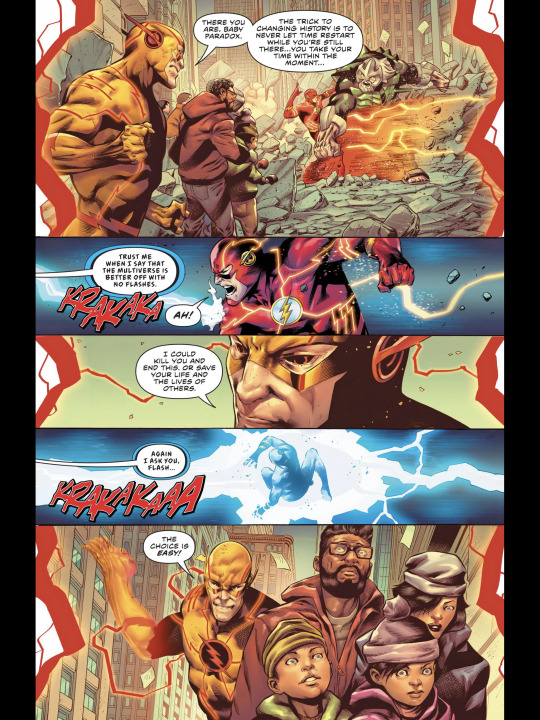
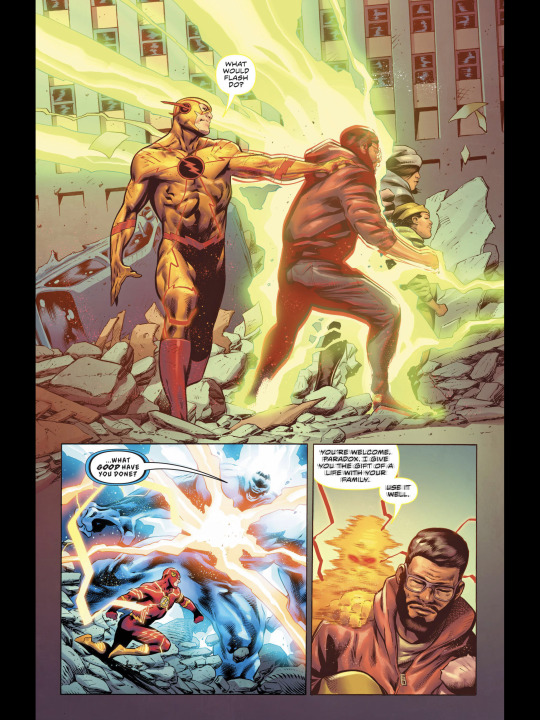
Pages from The Flash Age, by Joshua Williamson. In which Barry tells Eobard to "do the right thing", and Eobard just does it.
#thanks for asking anon#you didn't sound snarky at all no worries#I tried to be as exhaustive as possible without writing a wall of text#idk how well I managed#I just know I could talk about these two forever#my asks#eobarry#barry allen#eobard thawne#my meta
66 notes
·
View notes
Text
GYAAHHH people are reblogging ANCIENT art of mine
#mei talks#😭💀✌️ we don’t speak of Roosterteeth here any longer but#I genuinely do miss being in the RvB community! the people there were so so kind to me#I was something like 13 or 14 and still finding my legs art wise! I grew up in the community surrounded by people who#really poured their hearts and souls into their stuff and were sooo so kind to me#the art and writing communities were super tight and I actually am still in touch with many of them#including the man the myth the legend jason weight o7 you could have saved RvB if they kept you on for s18 king#like I still remember the day saltsanford sent me like. a 4 ask long text wall screaming about my lyric comic while I was in line at ax#nearly fainted#ahh my lyric comic….I still have it up on ur channel. before my dad passed away he would always show me when it hit a new milestone in view#old art is always kind of embarsssing and tbh I think my interpretations of the characters made me well known much more than my art skill#but after high school my life kind of. fell apart in a lot of ways. dad dying was def a part of that 💀 and I think I found orv exactly at#the time I needed it. but looking back at my old RvB stuff is kind of like#a little time capsule ig. I was happier then but I’ve grown up a lot too
57 notes
·
View notes
Text
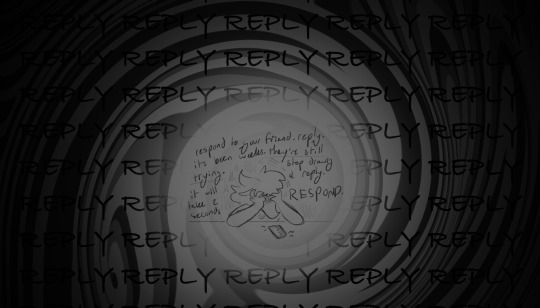
ah yes! the joys of executive dysfunction and something being Fundamentally Broken In Your Braincase!
#quick vent Look Away Nothing To See Here#i just needed to place my emotions somewhere before i really started to spiral#texts from cherished friends should not cause nausea-level anxiety! and yet!#here i am! running away from the ever-present miasma of guilt and stress!#you know a few months ago i was like 'im going to be better about responding im going to do better'#i Immediately started doing Worse!#i think i stressed myself out too much#pretty much every relationship i have ends up completely deteriorating due to my own insecurities and guilt and fucked up brain <3#ah yes and how could i forget the Commitment Issues and Emotional Block#mentally i am banging my head into a wall#but its fine Its Fine#i mean its not. its really not. but sometimes it seems like the harder i try the harder i fail#which is something i should be used to by now!#okay so it looks like i Am Indeed spiraling so#i am going to go... list some good things in this world and uhhh#well i dont have the car this weekend so cant go for a drive and some boba. um.#i need to organize my room table Yes that sounds distracting and falsely productive#not gonna tag this with anything actually.#love treating tumblr like my personal diary#ah yes its just me. my personal feelings. and the couple thousand people that follow me.#perhaps i will also buy something online with one of the gift cards i found the other day#buttons from michaels!!! i need buttons! i will go do that!#with the knowledge that i have unopened messages to respond to looming in the back of my mind like a noose! yippee yahoo!!!#gonna... turn of replies/rbs just this once since its just a Vent#i just needed to get it Out yk? not looking for anything other than relieving pressure on my brain#ok it looks like i cant turn of replies for individual posts#just... pretend you didnt see this for both our sakes <3#look away look away
115 notes
·
View notes
Photo
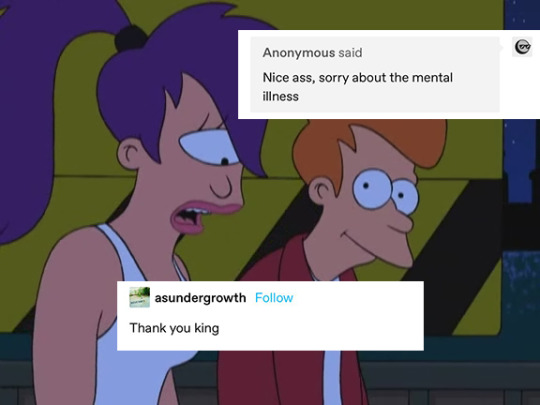

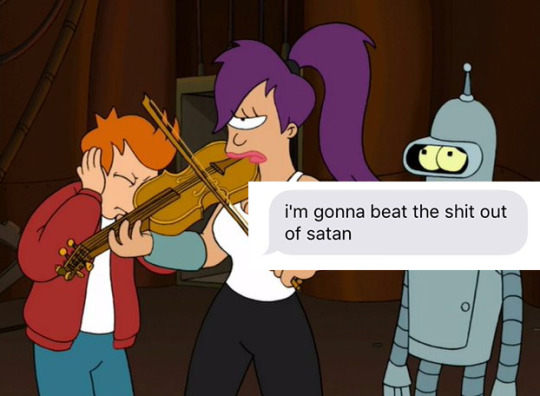




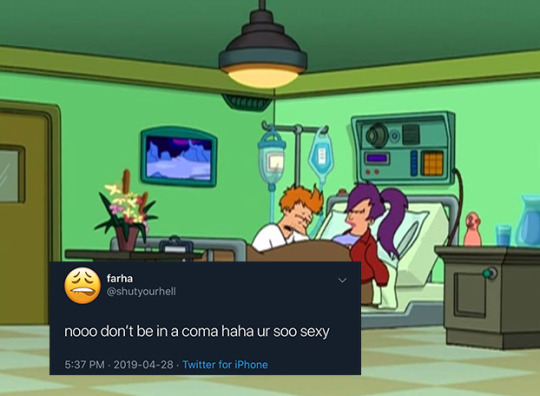
purely unhinged
#futurama#text post meme#if someone has already made these and i didn't see them i'm so sorry#i had these saved for a while bc i wanted to make a series but#i realized they were all a bit intense and off the wall and also they are funnier scattered like this#lmaoo#also bender's on that is ''i'm genderless i'm full of gender'' etc i was looking for two others like that to make a fry-leela-bender post#like that#but i couldn't find others that fit so oh well it's just bender for now
907 notes
·
View notes
Text
so to make it clear: the memories stolen were:
frost’s last memory of his parents and how he discovered his powers
torbek’s… like EVERYTHING. his motivation for this quest in the first place, his history with “the other” (is he the other?? that’s a whole ‘nother post), possibly how he met the gang in the witchlight carnival in the first place??? (also is gorebek GONE?? yet another post)
gideon’s clearest and happiest memory with his pa (mace made it so that he doesn’t even REMEMBER his dad but i am holding on to the hope that he still does bc i will actually throw up)
gricko’s guilt(?) between him and his mother after something about a piano (apologies i wasn’t able to pay much attention after realizing gideon had just lost a part of the happy childhood he had left((as well as the fact that he might have siblings but that’s another post)) and the revelation of twig and the baba yaga ((ANOTHER post)))
and kremy’s memory on how he met remy garou and how he got his warlock powers in the first place (how richie set this one up, iykyk, is yet ANOTHER post i need to make) does this mean kremy forgets who Remy is in the first place? (which would be a big problem regarding the debt) or just how they first met? we’ll find out next week.
i’ll definitely need to rewatch this later to properly fucking PROCESS all the lore they just slapped us with, good GODS this was a doozy of an episode.
#ouaw spoilers#sorry for the wall of text#but that’ll probably be what my next few posts are too#sorry for those who have to wale up to this#well#sorry not sorry#legends of avantris#once upon a witchlight
38 notes
·
View notes
Text
I really should be sleeping but my anxiety so instead here's a very long disjointed post with thoughts about the Man in the Wall after playing Whispers
Spoilers obviously
So the climax of the quest was us somehow holding back Mr. Big Indifference using a memory of love. And it makes sense, because what is the opposite of Indifference towards others? Caring about them. Which is kind of our (Tenno) entire thing. To Take Away Its Pain, etc. There's also Rell, who was also able to hold back Wally, and how he was alienated by his peers and even Marghulis, and the Orokin society who feared and shunned him and didn't treat him as a fellow human being deserves to be treated. As some of the Red Veil blood scrawls in his quest put it, "What is evil, but indifference?" It works quite well, thematically.
But Warframe doesn't really restrict itself to a singular, direct approach to invoking its themes. Shit's got layers. Which leads me to believe there may be other layers here, too.
And at this point, I'm really not convinced that Wally is so simple as the cosmic idea of Indifference towards others, or even a personification of fear and other 'dark' aspects of the human condition. I mean, I believe he is partially that, we do get that dialogue from Sythel "The first scholar looked into the Void and felt fear, and that fear took form. That's how all this started." Albrecht also refers to himself as the "Father of fears" in his notes somewhere (I forgor)
But... Fear is not Indifference. And the Man in the Wall not only shows great interest in many things (like Albrecht, and our Tenno) but he also shows a great deal of emotion. He is described by Duviri citizens as hungry, greedy, jealous. He has feelings, and he has a great deal of them. A being born of fear and indifference towards others doesn't really describe what we've seen of him very well. What Wally has been shown as time and time again is instead: a mirror. Our reflection.
So here's the rhetorical question I'd like to ask: If Albrecht gazed into the grand cosmic mirror of existence, and his first reaction was fear, well... it wasn't really the Void he was afraid of, was it?
...Which probably doesn't seem like a point worth all this build up, considering how during the quest, Albrecht's flaw of showing indifference to others (Loid, specifically) is brought up a few times. Albrecht looked into the Void, his Indifference and fear seeped in, and the result was Wally. Makes perfect sense. To which I say, look at the scrollbar to the side of this post because I have soooooo much more bullshit to spew about my thoughts on this.
Anyway. I've seen some theorizing that we're probably going to "defeat" the Man in the Wall by forgiving him or otherwise reaching out and showing him love, similar to the way we helped Umbra. Love will triumph over Indifference. And that makes sense and feels very Warframe and I do think that will happen. Buuuuut I don't think it's the only thing that's going to happen. Because if something is destroyed or undone by love, doesn't that... kind of undermine the message of loving an ugly, broken thing? Doesn't having the ultimate villain be some abstract space monster elder god representing pure un-love kind of jar with the very personal, human focus of Warframe's storylines? I don't think this is a Love vs. Indifference Pokemon typing match-up here, I don't think the Love requiem word is going to defeat the Indifference requiem word like a game of rock paper scissors. That would be too trite. Besides, it's not Wally's Indifference, really. It's Albrecht's.
And I've seen a lot, a lot of speculation that Wally "is" Albrecht, just a very derived evil alternate of him, and maybe Albrecht manages to convert himself into Wally as some kind of self-fulfilling quantum time-loop, becoming the reflection that reached out to his own self. It makes a lot of sense, what with the "We End as We Began" thing, and us encountering doppelganger smiley Albrecht in the quest. It works, thematically. This very well could be the answer and it wouldn't be bad storytelling per se.
However, for reasons I am not sure how to articulate at 3 am, I honestly kiiiiiind of hate it. It is not an ending to this that I'd be personally very satisfied with. Again, this doesn't mean it would be bad story-telling, or that other people wouldn't find it satisfying, it's just me and how I like my eldritch horror to be. So I choose to speculate other possibilities up until the point I am proven wrong, and if I am I promise to not be too annoyingly butthurt about it. Promise.
Here's my preferred take: I think the "Great Indifference" name for The Man in the Wall is a massive red herring. I think it relates far more meaningfully to what he actually is if you instead interpret it as "undifferentiated."
As in, the Void is a massive roiling quantum soup of all possible outcomes that could exist, but don't--to us. Specifically, us, as in our unique conscious POV, or "personal timeline" or "Chain of Khra" or quantum observer "cone of light" or whatever you want to call it. We are a 3rd dimensional ant stuck walking down a Mobius strip of cause and effect, and the Void is everything that we can not perceive from our tiny tiny window of specific probability variables. We are unable to "change the frame," as Euleria puts it, and I interpret that as "frame of reference."
While a lot of the differences are more... semantic than anything, Eternalism is not actually just Warframe's funny in-universe stand-in name for the Multiple Worlds Interpretation of Reality. This is a whoooooole another post worth of word vomit I won't get into now but Warframe did not come up with Eternalism it's an actual established thing that they're referencing.
The Void is everything, all at once. And if something is everything, in a way it is also... nothing. No contrast, no ups and downs, no loss, no birth, no death, no questions, and no mysteries to ponder. Joy is the same as sorrow, alive is the same as dead, "change" as a broad concept is impossible. If there is an opposite of human consciousness, of being alive and having lived, that's the closest thing I can think of.
There's a reason why the Void is shown in stark black and white until we put color into it... and in his original logs, Albrecht speaks of "scintillating vapor pouring out of my very skull." Human consciousness, our "light," (and the meaning of Albrecht's name, and the significance of us accidentally offering to let Wally "take our light" in the New War, etc) interacting with and reacting with the raw potential of the Void. It makes sense with the Wall being a bleak brutalist expanse of unmoving bone and dust, too. That could Wally's original, natural state: a solid block of grey, meaningless everything.
It would explain his jealousy of us, why he takes our appearance, echoes aspects of our personalities, uses our voices, picks at our memories and experiences. It's why he's fascinated with us. It is the one thing he isn't, the one thing he can not have. Or--at least, couldn't have, before Albrecht's intrusion. This is a side-note, but I find it very interesting that Wally's missing finger seems to have limited him in some way, that now he's constrained by the Chains of Khra, implying that before Albrecht, he was not.
Now I'm going to rewind waaay back to the topic of Wally being Albrecht's fear made manifest, and us defeating Wally by showing him love, not violence.
Because... I don't think our love is enough to fix things on its own. It isn't us who needs to show him love and understanding.
I think it has to be Albrecht.
The syndicate's plotline exploring a group of animals who had consciousness forced upon them, suddenly and violently and without consent, the difficulties they face grappling with it--I think that might echo the origin of the Man in the Wall. Consciousness being forced on not an animal, but the Void.
You know the quote, "We are the Universe learning about itself?" Maybe in this case, the universe had a very shitty teacher.
And imagine this consciousness being thrust into the Void, taking form within it as an out-of-control chemical reaction, how might it attempt to communicate with Albrecht, with the first 'other' it ever encountered? Perhaps mirroring his form, speaking in his voice, using an endearing and personal term from his childhood: "Little Bengel?" What if, for those brief seconds, The Man in the Wall was not actively malicious? What if he was reaching towards Albrecht not seeking to trap him in a predatory "deal," but out of a sincere desire for connection?
How would if feel then, to have your outstretched hand met with fear, disgust--a rejection so violent that your very fingers are severed by him slamming shut the door, an injury that leaves you weakened. A missing part of yourself, and nothing on your side of the wall to fill that hole with.
Well it would make you a little bit bitter, I assume. And if those fingers are then used to perform miracles of science, to serve as the foundation for the triumph of an entire empire... you might feel a bit like you're owed.
That bitterness may be compounded by the hypocrisy of it all, because all that you showed Albrecht was his own reflection. You might start to fixate on that hypocrisy, on those human flaws, on the parts of him that he didn't want to see. The reflection that he ran from, but further warped to emphasize what he tries to ignore. His shadow self.
And so you haunt him with his shadow, because you want him to be forced to see. To acknowledge those parts of him he wishes he wasn't, but you're everything: you know. You won't let him ignore you, to deny you. You are now a jealous, bitter thing. A hungry ghost.
You shove these flaws and bits of self-hatred back in his face because you want to make him look at them. To look in the mirror.
....To look at you. To acknowledge you exist. To see you as a thinking, feeling being.
And I do think our Tenno are capable of this. To see the Man in the Wall not as "The Other," but as Another. The opposite of Indifference. I think that will be an important part of our story.
But our story is not all of the story. It was not just any memory of love that drove back the Indifference, it was Albrecht's love. Unfortunately, I don't think Albrecht as we know him is capable of this, at least not as he is. He speaks of Wally as a malicious force, a cosmic evil that must be fought and only he is brilliant enough to figure out how. Even now, he refers to his reflection only with terms of disgust and shame. For all his monologues about guilt and his grand designs of martyrdom... he still thinks only in terms of himself. He thinks he understands his own guilt, and Wally delights in demonstrating all the ways that he does not.
"If I must be a demon, may I be an honest one." That statement is, itself, dishonest. Albrecht is not a demon. He is human.
And that's what he's so deeply, violently afraid of admitting, the fear the entire Orokin civilization built itself on top of as foundation. I believe that is the fear that manifested in The Man in the Wall.
And THAT is the kind of cosmic horror I want to see, while also feeling very Warframe. Crossing my fingers we get something closer to this and not just Albrecht accidentally (or purposely?) becoming an evil quantum demon.
There's actually like. A whole other section to this I was going to yammer on about but it's now 4:30 AM and whooopppsssssssss
#well having something to focus on does help anxiety brain so#wild and presumptuous speculation that probably only seems clever to me because of sleep deprivation#giant text wall. man in the text... wall. sorry#sorry for all of this#warframe spoilers#[the man in the wall]#[loreframe predictions]
46 notes
·
View notes